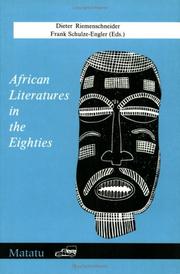| Listing 1 - 10 of 15 | << page >> |
Sort by
|
Book
ISBN: 9789004292260 9004292268 Year: 2015 Publisher: Leiden : Brill,
Abstract | Keywords | Export | Availability | Bookmark
 Loading...
Loading...Choose an application
- Reference Manager
- EndNote
- RefWorks (Direct export to RefWorks)
Théâtre (genre littéraire) swahili --- Roman swahili --- Histoire et critique --- Afrique orientale --- Vie intellectuelle --- Swahili drama --- Swahili fiction --- Literatur. --- Englisch. --- Swahili. --- Literaturbeziehungen. --- History and criticism. --- Africa, East --- Kenia. --- Tansania. --- Intellectual life. --- Vie intellectuelle. --- Histoire et critique. --- Théâtre (genre littéraire) swahili
Book
ISBN: 1282594613 9786612594618 904202884X 144161334X 9781441613349 9042025638 9789042025639 9789042028845 Year: 2009 Publisher: Amsterdam New York Rodopi
Abstract | Keywords | Export | Availability | Bookmark
 Loading...
Loading...Choose an application
- Reference Manager
- EndNote
- RefWorks (Direct export to RefWorks)
What is most strikingly new about the transcultural is its sudden ubiquity. Following in the wake of previous concepts in cultural and literary studies such as creolization, hybridity, and syncretism, and signalling a family relationship to terms such as transnationality, translocality, and transmigration, ‘transcultural’ terminology has unobtrusively but powerfully edged its way into contemporary theoretical and critical discourse. The four sections of this volume denote major areas where ‘transcultural’ questions and problematics have come to the fore: theories of culture and literature that have sought to account for the complexity of culture in a world increasingly characterized by globalization, transnationalization, and interdependence; realities of individual and collective life-worlds shaped by the ubiquity of phenomena and experiences relating to transnational connections and the blurring of cultural boundaries; fictions in literature and other media that explore these realities, negotiate the fuzzy edges of ‘ethnic’ or ‘national’ cultures, and participate in the creation of transnational public spheres as well as transcultural imaginations and memories; and, finally, pedagogy and didactics, where earlier models of teaching ‘other’ cultures are faced with the challenge of coming to terms with cultural complexity both in what is being taught and in the people it is taught to, and where ‘target cultures’ have become elusive. The idea of ‘locating’ culture and literature exclusively in the context of ethnicities or nations is rapidly losing plausibility throughout an ‘English-speaking world’ that has long since been multi- rather than monolingual. Exploring the prospects and contours of ‘Transcultural English Studies’ thus reflects a set of common challenges and predicaments that in recent years have increasingly moved centre stage not only in the New Literatures in English, but also in British and American studies.

ISBN: 9051835183 Year: 1993 Publisher: Amsterdam Rodopi
Abstract | Keywords | Export | Availability | Bookmark
 Loading...
Loading...Choose an application
- Reference Manager
- EndNote
- RefWorks (Direct export to RefWorks)

ISBN: 9004655999 9051835183 Year: 1993 Publisher: Amsterdam Rodopi
Abstract | Keywords | Export | Availability | Bookmark
 Loading...
Loading...Choose an application
- Reference Manager
- EndNote
- RefWorks (Direct export to RefWorks)
African literature --- History and criticism. --- anno 1980-1989
Book
ISBN: 9789042025639 Year: 2009 Volume: 102 12 Publisher: Amsterdam [etc.] Rosopi
Abstract | Keywords | Export | Availability | Bookmark
 Loading...
Loading...Choose an application
- Reference Manager
- EndNote
- RefWorks (Direct export to RefWorks)
What is most strikingly new about the transcultural is its sudden ubiquity. Following in the wake of previous concepts in cultural and literary studies such as creolization, hybridity, and syncretism, and signalling a family relationship to terms such as transnationality, translocality, and transmigration, ‘transcultural’ terminology has unobtrusively but powerfully edged its way into contemporary theoretical and critical discourse. The four sections of this volume denote major areas where ‘transcultural’ questions and problematics have come to the fore: theories of culture and literature that have sought to account for the complexity of culture in a world increasingly characterized by globalization, transnationalization, and interdependence; realities of individual and collective life-worlds shaped by the ubiquity of phenomena and experiences relating to transnational connections and the blurring of cultural boundaries; fictions in literature and other media that explore these realities, negotiate the fuzzy edges of ‘ethnic’ or ‘national’ cultures, and participate in the creation of transnational public spheres as well as transcultural imaginations and memories; and, finally, pedagogy and didactics, where earlier models of teaching ‘other’ cultures are faced with the challenge of coming to terms with cultural complexity both in what is being taught and in the people it is taught to, and where ‘target cultures’ have become elusive. The idea of ‘locating’ culture and literature exclusively in the context of ethnicities or nations is rapidly losing plausibility throughout an ‘English-speaking world’ that has long since been multi- rather than monolingual. Exploring the prospects and contours of ‘Transcultural English Studies’ thus reflects a set of common challenges and predicaments that in recent years have increasingly moved centre stage not only in the New Literatures in English, but also in British and American studies.

ISBN: 9042015497 904201539X 900448650X 9789042015395 9789042015494 9789004486508 Year: 2002 Volume: 59 Publisher: Amsterdam: Rodopi,
Abstract | Keywords | Export | Availability | Bookmark
 Loading...
Loading...Choose an application
- Reference Manager
- EndNote
- RefWorks (Direct export to RefWorks)
The essays in this collection celebrate the signal achievement of Dieter Riemenschneider in helping found and consolidate the study of postcolonial anglophone literatures in Germany and Europe. As well as poems, a short story, drawings of the Indian scene (the first, and abiding, focus of this scholar’s work), and ‘letters’ of reminiscence (one quite grave), there are revealing contributions of a literary-historical nature on the establishment of anglophone (especially African) literatures as an academic discipline within Germany, the UK, and Northern Europe generally, as well as a group of searching reflections on such topics of postcolonial import as globalization and the applicability of models to the literature of the indigene in Canada and Australia. The largest section is devoted to individual topics, each treatment implicitly keyed to approaches to the teaching of New Literatures texts. Writers covered include Anita Desai (landscape and memory), Salman Rushdie (painting in The Moor’s Last Sigh), Charlotte Brontë (imperial discourse in Jane Eyre), Derek Walcott (Omeros and cultural cohabitation), and Witi Ihimaera (his rewriting of Katherine Mansfield). Topics dealt with include music and radio in West Africa, the African literary ‘hit parade’, the New Zealand prose poem, Canadian and Australian war fiction, the Middle Passage in the American and Caribbean novel, Paul Theroux’s uneasy relations with V.S. Naipaul, and the colonial discourse of illness and recuperation. The volume closes with Dieter Riemenschneider’s very first and most recent critical essays, the one a classic on Mulk Raj Anand, the other a challenging and doubtless controversial thesis on postcolonial minority writing. A select bibliography of Riemenschneider’s work (books, edited publications, journal articles and book contributions, reviews and broadcasts) rounds off this substantial collection.
English literature --- British Commonwealth --- Commonwealth literature (English) --- Study and teaching --- Study and teaching (Higher)
Book
Year: 1998 Publisher: Frankfurt am Main : Johann Wolfgang Goethe-Universität. Institut für England- und Amerikastudien,
Abstract | Keywords | Export | Availability | Bookmark
 Loading...
Loading...Choose an application
- Reference Manager
- EndNote
- RefWorks (Direct export to RefWorks)
Book
ISBN: 9783868213744 Year: 2013 Publisher: Trier : WVT Wissenschaftlicher Verlag Trier,
Abstract | Keywords | Export | Availability | Bookmark
 Loading...
Loading...Choose an application
- Reference Manager
- EndNote
- RefWorks (Direct export to RefWorks)
Postcolonial Literatures in English have become a central field of research and study all over the world. This series of introductory readers covers (1) South Asian Literatures, (2) Australian, New Zealand and Pacific Literatures, (3) African Literatures, (4) Canadian Literatures, (5) Caribbean Literatures and (6) Black and Asian British Literatures. The edited collections of source materials are designed to help students and teachers in exploring the diversity of the global cultural networks which have arisen from the British Empire and Commonwealth. Each volume contains an introduction that sketches out major trends and developments in the region and provides recommendations for further reading. The specificities of each respective region are explored within a framework focussing on histories, identities, language, education, movements and genres, as well as transcultural perspectives. Ever since the late 19th century European “Scramble for Africa”, English has been an important constituent of Africa’s cultural and intellectual make-up. What had once been introduced as the colonizer’s tongue became a language of anticolonial liberation and remains a medium employed by Anglophone writers from West, East and Southern Africa to engage not only with Africa’s colonial past, but also with the social, political and cultural complexities and contradictions of its post-independence present. The third volume in the series “Postcolonial Literatures in English: Sources and Resources” seeks to provide an introduction to the English-language literatures of Africa through a collection of texts selected for the contribution they make to the contextualisation of these literatures. It covers the history of the English language on the African continent, the use of the language by African writers, the oral tradition, the impact of missionary education on Africans, the issues of identity which have informed their writing, the debates which have accompanied the emergence of African literature in English and the current state of African literary practice including its transnational and transcultural dimensions.
Book
ISBN: 1040255299 Year: 2024 Publisher: Oxford : Taylor & Francis Group,
Abstract | Keywords | Export | Availability | Bookmark
 Loading...
Loading...Choose an application
- Reference Manager
- EndNote
- RefWorks (Direct export to RefWorks)
This book explores core issues in the emerging field of World Anglophone Studies. It shows that traditional frameworks based on the colonial and imperial legacies of English need to be revised and extended to understand the complex adaptations, iterations, and incarnations of English in the contemporary world.
English language --- Postcolonialism in literature. --- Globalization.
Book
ISBN: 9004425268 9004420096 Year: 2020 Publisher: Leiden, The Netherlands ; Boston, Massachusetts : Brill,
Abstract | Keywords | Export | Availability | Bookmark
 Loading...
Loading...Choose an application
- Reference Manager
- EndNote
- RefWorks (Direct export to RefWorks)
African-Asian interactions contribute to the emergence of a decentred, multi-polar world in which different actors need to redefine themselves and their relations to each other. Afrasian Transformations explores these changes to map out several arenas where these transformations have already produced startling results: development politics, South-South cooperation, cultural memory, mobile lifeworlds and transcultural connectivity. The contributions in this volume neither celebrate these shifting dynamics as felicitous proof of a new age of South-South solidarity, nor do they debunk them as yet another instance of burgeoning geopolitical hegemony. Instead, they seek to come to terms with the ambivalences, contradictions and potential benefits entailed in these transformations – that are also altering our understanding of (trans)area in an increasingly globalized world. Contributors include: Seifudein Adem, Nafeesah Allen, Hanna Getachew Amare, Tom De Bruyn, Casper Hendrik Claassen, Astrid Erll, John Njenga Karugia, Guive Khan-Mohammad, Vinay Lal, Pavan Kumar Malreddy, Jamie Monson, Diderot Nguepjouo, Satwinder Rehal, Ute Röschenthaler, Alexandra Samokhvalova, and Sophia Thubauville.
Globalization --- Acculturation --- Africa --- Asia --- Relations
| Listing 1 - 10 of 15 | << page >> |
Sort by
|

 Search
Search Feedback
Feedback About UniCat
About UniCat  Help
Help News
News